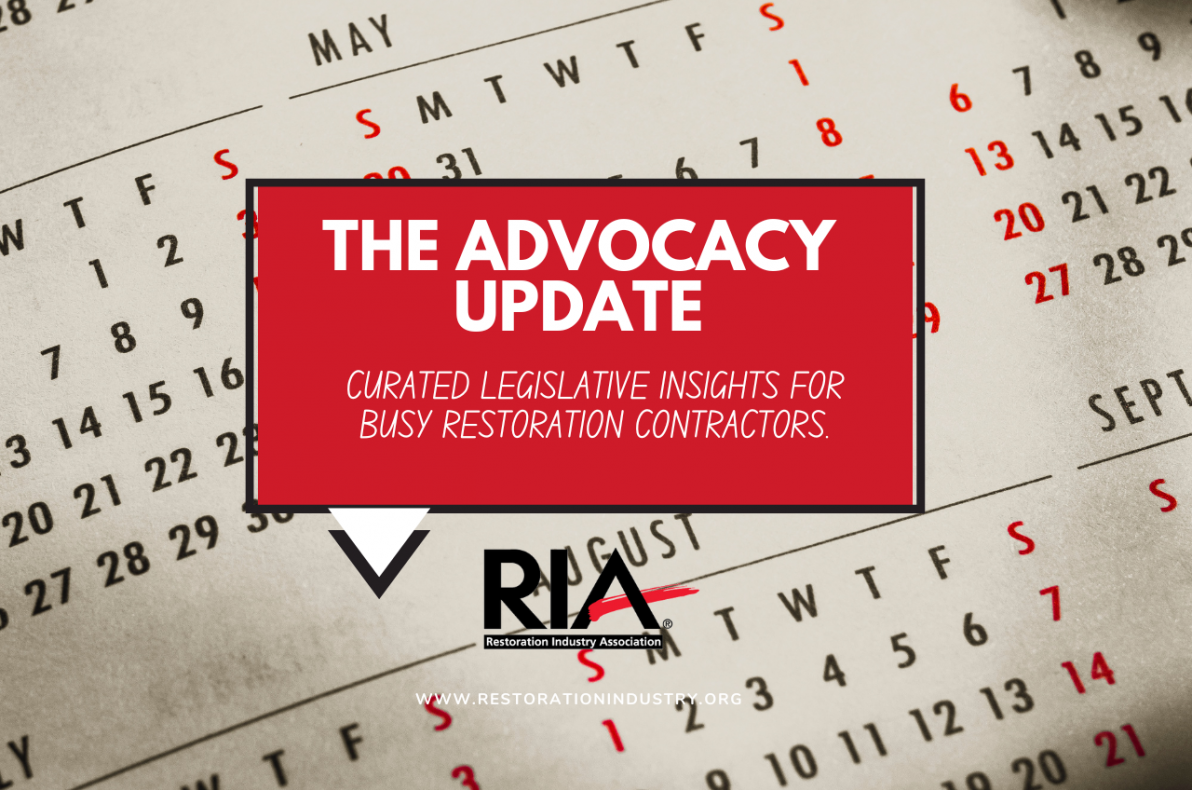The Advocacy Update: October 15th, 2025

October 15, 2025
Stay informed without the overwhelm. The Advocacy Update delivers clear, curated legislative updates restoration contractors can trust, highlighting the bills, policies, and issues that matter most to your business. Each week, get a quick, actionable overview to keep you prepared and ahead in a rapidly changing landscape.
With the deadline for Governor Newsom to sign or veto bills being this past Saturday, there are two bills that were enacted that we want to highlight. As the current California session is still active, albeit adjourned, any bill that has been vetoed will be returned to the state legislature for a vote to overturn the veto.
Bill |
Summary |
Statement from Newsom’s Office |
CA SB 517 |
SB 517 seeks to expand transparency and accountability relating to subcontractors. First, this bill specifies that the prime or direct contractor is responsible for the completion of a project in accordance with the signed home improvement contract, plan, or specification, and is subject to administrative discipline for failure to comply. However, this bill clarifies that while administrative responsibility rests with the prime or direct contractor, subcontractors or home improvement salespersons are not precluded from administrative discipline for violations. Furthermore, this bill would require home improvement contracts to contain a disclosure regarding whether or not subcontractors will be used for the project. This bill will require more transparency for subcontractors while simultaneously asserting project completion responsibility on the primary contractor. Overall, this bill impacts restoration contractors by regulating their usage and reporting of subcontractors for restoration work. |
No statement or press available. |
CA SB 610 |
SB 610 makes several changes related to disaster-related provisions for mobile homes and rental units. This bill requires landlords of rental units to undertake actions necessary to remediate any dilapidations that arise as a result of a disaster within a reasonable time and according to specified cleaning protocols. Further, the presence of debris at a rental unit renders the unit automatically untenable until an official determination is made otherwise, with a focus on monitoring toxic substances. Furthermore, landlords are required to notify tenants in writing when a landlord has fulfilled their legal duties to remediate disaster-related dilapidations; landlords are not required to rebuild any part or whole of residential real property that was destroyed due to a disaster, and tenancy remains in effect as soon as it is deemed safe and practicable. Tenants are not required to pay rent during any period where they are unable to occupy their rental unit due to a disaster and mandatory evacuation. While this bill does not wholly impact restoration contracting, there are parts that may. In particular, new rules that require landlords to fix damaged properties following disasters will decrease disaster-related tenancy cancellations and increase the need for rapid restoration contracting, as landlords will no longer receive income for the units, inhabited or not. |
‘Protecting homeowners and tenants after disaster: SB 610 (Pérez) expands disaster protections for tenants, mobile home residents, and borrowers. Landlords must remove hazardous debris and maintain habitability, while tenants retain return rights at pre-disaster rents. Mobile home residents are entitled to rent refunds, relief during evacuations, and relocation benefits if parks close.’ (Source) |
Stay Connected & Support Advocacy
Follow us on social media to stay engaged with the latest updates and advocacy wins. Ready to get involved or support the mission? Email info@restorationindustry.org to learn how you can participate and support the RIA's advocacy efforts.
These weekly updates are part of RIA’s mission to educate, advocate, and elevate the restoration industry—empowering contractors to navigate legislative challenges and shape a stronger future for all.
